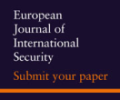European Journal of International Security, Issue 2:1. View full article here.
By Cristina G. Stefan, University of Leeds, UK
The Responsibility to Protect (R2P) norm has been discussed extensively since its initial emergence in the 2001 report on the topic, and especially after 2005, when it was institutionalized at the UN. The UN Secretary-General’s 2009 report Implementing the Responsibility to Protect introduced the ‘Three Pillars’ approach to R2P, which now informs all debates on this topic meant to shape responses to mass atrocity crimes. This article’s emphasis on a non-Western initiative, meant to reshape and clarify R2P, was triggered by the call to pay greater attention to the agency role of non-Western ideas and actors in building global order. Drawing on a notable example of a non-Western normative initiative, Brazil’s ‘Responsibility while Protecting’ (RwP), this article contributes to broadening the scope of the norm dynamics literature beyond its common Western-centric focus. Post-2011 Libya intervention, Brazil proposed RwP to clarify what ‘using force’ means under the Responsibility to Protect (R2P) banner, but then withdrew from visible norm sponsorship, only to return to this as part of a collective exercise to institutionalize R2P at the UN.
This article has two main reasons for examining Brazil’s RwP initiative: first, because it represents the normative engagement of a non-Western agent; and second, because it pertains to the most contentious aspect of R2P – Pillar Three’s use of force component – which makes the R2P norm controversial and contested. The 2011 NATO-led intervention in Libya triggered a renewed wave of contestation of R2P, with its application to the Libya crisis being the first time the Security Council invoked R2P under the coercive Chapter VII of the UN Charter. Brazil was serving as the President of the UN Security Council in February 2011, when Security Council Resolution 1970 on Libya passed unanimously. Also important, and quite unique is the fact that all the BRICS were present in the UN Security Council at the time. Brazil’s response, in the form of the RwP initiative, was meant to clarify what using force under the R2P banner should look like. The ‘responsibility while protecting’ formula proposed complementing, not substituting, R2P with a set of principles that guide the Security Council’s decision-making process about the use of force and ensure accountability of interveners. Discussing the significance of Brazil’s initiative provides the empirical context to investigate first and foremost the role of non-Western agency in international norm dynamics, especially in regard to reshaping norms traditionally associated with Western normative input.
First, the article highlights the significant role of non-Western agents whose contributions usually go overlooked, yet carry the highest potential to address the legitimacy deficit of norms like R2P. After Brazil’s initial contribution in the form of the RwP concept note, it later on became a member of a cross-regional group that worked on a draft UN General Assembly resolution on the R2P in 2015-2016, to celebrate the norm’s tenth anniversary at the UN. This cross-regional group was designed to be representative and inclusive, and Brazil was viewed as speaking on behalf of non-Western constituencies. Despite the failure of the cross-regional group to produce a GA resolution on R2P adopted by consensus at the 71st session of the UNGA, Brazil’s active engagement behind closed doors to ensure RwP-alike provisions make it into the draft resolution reflects significant shaping efforts. We know that new norms are more likely to spread if the responsibility for their creation and promotion is more broadly shared. Brazil’s proposal to refine R2P is significant precisely because it shares this responsibility, through legitimately claiming agency in developing and championing protection norms, to better reflect its own values and interests.
Second, the article proposes adding a new conceptual tool when investigating the role of agency in norm dynamics, one that incorporates a wider range of norm ‘shaping’ processes and highlights enabling, contingent circumstances. The latter, is argued, best captures the anomalies in contemporary norm contestation. This is illustrated through an empirical analysis of the conditions under which Brazil was able to advance RwP, despite the subsequent emergence of unfavourable circumstances. RwP challenges the belief that non-Western powers can only either reject or implement a norm, but not contribute to its normative development, at least not in terms of critically shaping its meaning. The timeline of Brazil’s involvement with RwP examined in this article shows that it has played an active role in reshaping R2P, both vocally and openly, and less visibly behind closed-doors. The article discusses three factors, which taken together, allowed Brazil to vocally advance RwP, for a period of time. However, once the favourable circumstances changed, so too did Brazil’s norm shaping abilities. The first factor relates to changes in Brazil’s domestic context, namely the drastic shift from the domestic politics of 2011 and 2012 to the political turmoil that followed, and remained the case throughout Brazil’s engagement with the cross-regional group working towards the draft GA resolution in the last year. Human agency is another key factor when assessing drivers behind Brazil’s push for RwP in the first place. Antonio Patriota (who was Brazil’s Foreign Minister when RwP emerged) deserves credit as the main voice behind, and promotor of, RwP, who worked closely with other vocal supporters of R2P, such as Gareth Evans. The third driver behind Brazil’s push for RwP – and its subsequent change in behaviour – relates to the unique context in which Brazil operated at the UN when proposing RwP. The institutional context was a significant enabling factor since Brazil’s role as a non-permanent member of the Security Council provided the platform to get closely engaged with issues concerning international peace and security. As an elected member of the Council, Brazil was able to exercise influence which otherwise would not have been possible. Indeed, RwP emphasizes agency contingent upon a specific context – or a unique set of circumstances – in which ‘norm shapers’ like Brazil operate at a given time.




No comments yet.